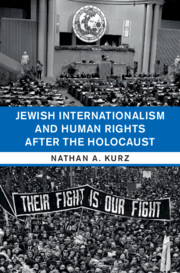19 results
Abbreviations
-
- Book:
- Jewish Internationalism and Human Rights after the Holocaust
- Published online:
- 05 November 2020
- Print publication:
- 26 November 2020, pp xi-xi
-
- Chapter
- Export citation
Copyright page
-
- Book:
- Jewish Internationalism and Human Rights after the Holocaust
- Published online:
- 05 November 2020
- Print publication:
- 26 November 2020, pp iv-iv
-
- Chapter
- Export citation
Conclusion
-
- Book:
- Jewish Internationalism and Human Rights after the Holocaust
- Published online:
- 05 November 2020
- Print publication:
- 26 November 2020, pp 186-193
-
- Chapter
- Export citation
5 - From Antisemitism to “Zionism Is Racism”
-
- Book:
- Jewish Internationalism and Human Rights after the Holocaust
- Published online:
- 05 November 2020
- Print publication:
- 26 November 2020, pp 112-137
-
- Chapter
- Export citation
6 - The Inadequacy of Madison Avenue Methods
-
- Book:
- Jewish Internationalism and Human Rights after the Holocaust
- Published online:
- 05 November 2020
- Print publication:
- 26 November 2020, pp 138-163
-
- Chapter
- Export citation
7 - “Good Words Have Become the Servants of Evil Masters”
-
- Book:
- Jewish Internationalism and Human Rights after the Holocaust
- Published online:
- 05 November 2020
- Print publication:
- 26 November 2020, pp 164-185
-
- Chapter
- Export citation
Contents
-
- Book:
- Jewish Internationalism and Human Rights after the Holocaust
- Published online:
- 05 November 2020
- Print publication:
- 26 November 2020, pp vii-vii
-
- Chapter
- Export citation
2 - Who Will Tame the Will to Defy Humanity?
-
- Book:
- Jewish Internationalism and Human Rights after the Holocaust
- Published online:
- 05 November 2020
- Print publication:
- 26 November 2020, pp 39-63
-
- Chapter
- Export citation
1 - “Individual Rights Were Not Enough for True Freedom”
-
- Book:
- Jewish Internationalism and Human Rights after the Holocaust
- Published online:
- 05 November 2020
- Print publication:
- 26 November 2020, pp 19-38
-
- Chapter
- Export citation
4 - Exit from North Africa
-
- Book:
- Jewish Internationalism and Human Rights after the Holocaust
- Published online:
- 05 November 2020
- Print publication:
- 26 November 2020, pp 86-111
-
- Chapter
- Export citation
Introduction
-
- Book:
- Jewish Internationalism and Human Rights after the Holocaust
- Published online:
- 05 November 2020
- Print publication:
- 26 November 2020, pp 1-18
-
- Chapter
- Export citation
3 - The Consequences of 1948
-
- Book:
- Jewish Internationalism and Human Rights after the Holocaust
- Published online:
- 05 November 2020
- Print publication:
- 26 November 2020, pp 64-85
-
- Chapter
- Export citation
Notes
-
- Book:
- Jewish Internationalism and Human Rights after the Holocaust
- Published online:
- 05 November 2020
- Print publication:
- 26 November 2020, pp 194-254
-
- Chapter
- Export citation
Acknowledgments
-
- Book:
- Jewish Internationalism and Human Rights after the Holocaust
- Published online:
- 05 November 2020
- Print publication:
- 26 November 2020, pp viii-x
-
- Chapter
- Export citation
Bibliography
-
- Book:
- Jewish Internationalism and Human Rights after the Holocaust
- Published online:
- 05 November 2020
- Print publication:
- 26 November 2020, pp 255-281
-
- Chapter
- Export citation
Index
-
- Book:
- Jewish Internationalism and Human Rights after the Holocaust
- Published online:
- 05 November 2020
- Print publication:
- 26 November 2020, pp 282-298
-
- Chapter
- Export citation
Dedication
-
- Book:
- Jewish Internationalism and Human Rights after the Holocaust
- Published online:
- 05 November 2020
- Print publication:
- 26 November 2020, pp v-vi
-
- Chapter
- Export citation
Dramatis Personae
-
- Book:
- Jewish Internationalism and Human Rights after the Holocaust
- Published online:
- 05 November 2020
- Print publication:
- 26 November 2020, pp xii-xiv
-
- Chapter
- Export citation

Jewish Internationalism and Human Rights after the Holocaust
-
- Published online:
- 05 November 2020
- Print publication:
- 26 November 2020



